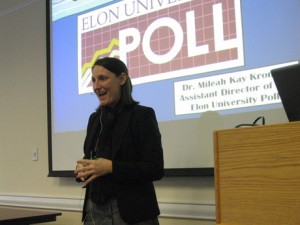
The Elon University Poll is recognized as “The poll of record in the State.” Adding luster to this reputation, The New York Times, The Boston Globe, Associated Press, and Politico all reported findings from a recent Elon poll addressing Tar Heel opinions on President Obama’s handling of the economy, same-sex marriage, job proposals, taxes on millionaires, and other issues high on the list of political concerns.
“North Carolina is a swing state,” Dr. Mileah Kromer recently told an enthusiastic audience in the Carolina Meadows Lecture Hall. Expect plenty of excitement starting with our state’s May primary and into the November General Election, she said. And count on the Elon pollsters to document the results from the fireworks.
Dr. Kromer is Assistant Professor of Political Science and Assistant Director of the Elon University Poll. With expertise in statistics, political science and Southern politics, she oversees the non-partisan Elon Poll. Founded in 2000, it is neutral, independent, and fully funded by Elon University as a public service to citizens.
Unlike other polling groups conducted by hired professionals, the Elon Poll is staffed by students who come from all disciplines. They conduct three polls per semester and their work at the poll is integrated into their academic curriculum. Their training is designed to apply analytical skills to practical political issues.
During the polling dates, students man 40 lab stations on campus, conducting interviews through both landline and cell phones. Using a stratified random sampling of households they reach adults 18 years and older, representative of the N.C. population. The interviews last about 20 minutes and are conducted over four to five days from Sunday through Thursday.
The survey aims to measure issues, policies, and candidates’ status or support as well as the “why and who” of citizens’ support. Students interview from 500 to 600 households. The survey is considered complete when respondents complete at least 80 percent of the questionnaire. In a sample size of 600 interviews there is a 95-percent probability that survey results are within a margin of error of 4.1 percentage points.
“This is a policy-based poll, not a horse race poll,” says Kromer. With transparency the point, questions are designed to eliminate ambiguous terms, leading or loaded questions, or loaded language. “Clarity means the questions asked must mean the same to you and to me,” Kromer says. Distinguishing between words like “protestor or demonstrator,” “global warming or climate change” are key to eliciting an accurate gauge of North Carolina citizens’ opinions and concerns.
“Politerate” is an invented term defined by Dr. Kromer as “a condition of being knowledgeable in public opinion polling.” In reaching that goal, the students prove that the Elon University Poll is among the best regional polls in the country.
By Dorothy Mahan
